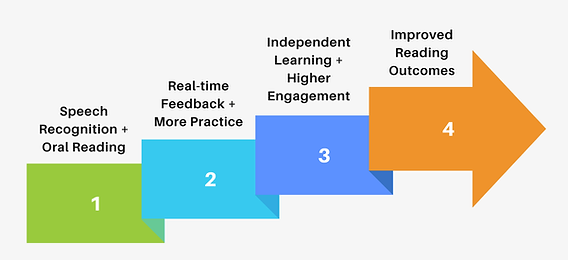Efficacy Study on English Islands' Automated Literacy Tutor


Meets ESSA Tier 3 evidence
A well-designed correlational study that statistically controls for selection bias and demonstrates a statistically significant positive impact on literacy outcomes.
Abstract
This research investigates the effectiveness of the English Islands early literacy platform, which utilizes speech recognition technology for real-time oral literacy assessment.
Introduction
Online literacy platforms are frequently used in assessing and enhancing students' literacy outcomes. Traditional multiple-choice style literacy platforms are often criticized for not fully capturing students' reading abilities, particularly in terms of oral reading performance. The conventional methods of assessment (notably multiple-choice questions) have limitations, including the potential for guessing correct answers and the inability to assess oral reading ability. The English Islands platform aims to address these shortcomings by leveraging speech recognition technology to provide immediate feedback on students' oral reading skills. This study seeks to validate the efficacy of English Islands in improving early literacy outcomes.
Methodology
The study utilized a pre-post intervention design to evaluate the impact of the English Islands platform on students' reading abilities. The participants were 60 early learners (Kindergarten through Grade 3) at a mid-sized suburban school board who engaged with the platform over a period of 4 weeks, during which they spent an average of 10-5 minutes on the site, 3 times per week. Each student's reading performance was assessed using the platform's real-time feedback feature, which identified which phoneme-grapheme pairs were read correctly versus incorrectly. Statistical analysis included a paired t-test to compare pre-intervention and post-intervention test scores, and also an analysis of the dose-response relationship between duration of practice and score improvement.
Results
The results of the paired t-test revealed a highly statistically significant improvement in students' reading scores after using the English Islands platform (t(55) = 5.7728, p < 0.0001). On average, students demonstrated a mean improvement of 6.8% in their test scores (95% CI [-7.43, -3.60]). This improvement underscores the platform's effectiveness in enhancing early literacy skills.
It is noteworthy that one of the classes involved in the study was learning new material that had never been introduced in the classroom before, and was also not taught in the classroom throughout the duration of the research project. This class worked on English Islands solely at home, and spent an average of 68% more time on the platform than the classes who worked on English Islands during school hours. This class averaged a higher (9.3%) improvement in reading scores, highlighting the robustness of the platform in supporting independent student learning.
Additionally, the results of a correlation analysis indicate a statistically significant positive relationship between the number of terms practiced on the English Islands platform and improvement in test scores (r = 0.29, p = 0.036). This finding suggests that the more time students spend practicing on the platform, the more their performance on literacy assessments improves.
Notably, the top 10% of students (in terms of time spent studying on English Islands) improved reading scores by 19.3%. This figure is nearly triple the average improvement rate, indicating that more frequent platform usage results in significantly higher improvement in literacy outcomes.
Paired t test results
P value and statistical significance: The two-tailed P value is less than 0.0001. By conventional criteria, this difference is considered to be extremely statistically significant.
Confidence interval:
The mean of Group One minus Group Two equals -5.52
95% confidence interval of this difference: From -7.43 to -3.60
Intermediate values used in calculations:
t = 5.7728
df = 55
standard error of difference = 0.956


.png)
Discussion
The findings highlight the impact of the English Islands platform on early literacy acquisition, suggesting that the utilization of speech recognition for real-time assessment and feedback enhances students' reading abilities. The statistically significant results of the paired t-test support the platform's potential to improve literacy instruction.
Furthermore, the dose-response analysis demonstrates a statistically significant correlation coefficient (r = 0.29, p < 0.05). This supports the hypothesis that increased engagement with the English Islands platform correlates with enhanced early literacy skills. This dose-response relationship underscores the platform’s potential to foster independent skill development through interactive, oral learning experiences. Educators can leverage these findings to encourage consistent use of the platform as part of effective literacy instruction strategies.
As mentioned, it is noteworthy that one class learned new material exclusively at home using English Islands, spending 68% more time on the platform than classes using it solely during school hours. Despite not learning the material from their teacher at any time, these students had a higher improvement rate than students who had also learned the material in class. This showcases the platform's effectiveness in fostering independent learning.
It is important to discuss that during the exit interview, teachers reported that from time to time, students received “fail” responses despite reading a term correctly, and occasionally some received “pass” responses after reading a term incorrectly. This issue was largely addressed with platform updates, but as speech recognition technology is not perfect, it cannot currently be completely resolved. However, it is worth considering that despite the imperfections, students overall still enjoyed using the platform and improved their literacy skills significantly.
Conclusion
In conclusion, the research substantiates that the English Islands platform accelerates early learners' independent acquisition of basic reading skills. As this study was conducted over a very short period of time (4 weeks), future studies could explore the platform's long-term effects to further validate efficacy. Future studies would also benefit from the addition of control groups, as well as exploring application in more diverse educational settings.

.png)
Author
Erica Derrickson, background education at Georgetown University and Rice University, former educator and manager of international education programs, current founder of Ai Land Games.
Date: July 8th, 2024
